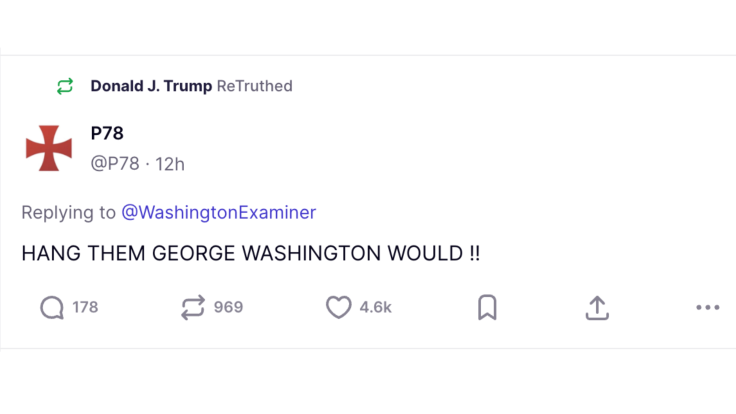'Panicked' Trump Calls for Arrest of Democrats and Amplifies Calls to 'Hang Them'
President Trump demanded the arrest of six Democratic lawmakers.

Donald Trump escalated a political confrontation on 20 November 2025 by demanding the arrest of six Democratic lawmakers and amplifying a supporter's call that they be 'hung', after they released a short video urging service personnel to refuse unlawful orders.
The video, titled 'Don't Give Up The Ship', was posted by Senator Elissa Slotkin and features six former service and intelligence officers now in Congress, urging members of the military and intelligence community to remember their oath to the Constitution and refuse orders that would be unlawful. The clip, roughly 60 seconds long, repeatedly states: 'You can refuse illegal orders. You must refuse illegal orders.'
President's Reaction And The 'Hang Them' Post
Within hours, the former president used his Truth Social platform to condemn the lawmakers as 'traitors' and to call for their arrest and trial, writing that 'an example MUST BE SET'. In a later repost, shared to his followers, he amplified a user message that read, 'HANG THEM GEORGE WASHINGTON WOULD !!', a phrase subsequently carried and documented by multiple mainstream outlets.
The amplification is notable because it converts a partisan dispute over civil–military norms into a moment in which a sitting national leader effectively echoed a violent invocation. Reporting across outlets shows the sequence: lawmakers publish a legal-framed appeal, critics condemn it as seditious, and the president responds by urging accountability in the most expansive terms.

The Law, The Oath, And What 'Illegal Orders' Means
Military law and constitutional practice are at the heart of the dispute. Service members swear to 'support and defend the Constitution', not a person, and longstanding legal doctrine requires refusal of 'manifestly unlawful' orders, a narrow but crucial safeguard against criminal commands. Legal scholars caution that while the duty to obey lawful orders remains, exhortations to refuse illegal commands are consistent with long-standing military ethics and precedent.
That technical distinction has been lost in much of the partisan heat. Conservative commentators and several Republican officials characterised the video as a political appeal that risks undermining civilian control of the military. Administration allies, including Secretary of War Pete Hegseth, dismissed the lawmakers' message as part of an attack on the administration and framed it as dangerously politicised. The lawmakers and their offices insist their message was legalistic, intended to reassure service personnel that the law protects them should they be asked to carry out unlawful acts.
Political Fallout And Security Risks
The episode has immediate political consequences and longer-term security implications. Domestically, calls to arrest elected colleagues and the amplification of lynch-style rhetoric deepen polarisation and risk normalising violent language in political disputes. Historical reporting shows that incendiary rhetoric from influential figures can inspire violent threats and action, a dynamic documented repeatedly in recent years.
On the security front, the friction threatens to fracture public trust in the military's neutrality. The lawmakers involved include veterans and ex-intelligence officers who say they are trying to preserve that neutrality; critics say the timing and framing risk eroding discipline. Meanwhile, the president's public call for arrests of political opponents raises immediate legal and constitutional questions about the misuse of prosecutorial power for partisan ends, charges that legal experts say deserve independent scrutiny rather than rhetorical escalation.
Voices And Stakes: Human Drama At The Centre
The human stakes are unmistakable. The lawmakers featured in the clip spoke from personal experience in uniform and intelligence; their appeal was aimed at anxious service members and families caught between oath and order. Opponents have seized on fear and outrage, leveraging social platforms to magnify threat narratives. The result is a fast-moving information cascade in which violent invective and constitutional argument are mixed in a way that puts individuals, elected officials, service personnel, and citizens at emotional and physical risk.
Journalists and analysts must now trace the provenance of each public claim: the original video as posted by the lawmakers; the president's own posts and reposts on Truth Social; and subsequent amplification across platforms that may stoke real-world harm. Primary, timestamped sources, the Slotkin posting of the video, and the president's Truth Social entries are essential to maintain factual clarity in the midst of partisan spin.
The broader lesson is stark: in an era of instantaneous social amplification, words from the top of politics can cascade into threats to democratic norms and to people's safety. When public leaders endorse or repeat calls that invoke execution, even by echoing a supporter, institutions and voters must judge both the legal boundaries and the human consequences.
A democracy cannot long survive if political disagreement is met with threats rather than argument.
© Copyright IBTimes 2025. All rights reserved.




















